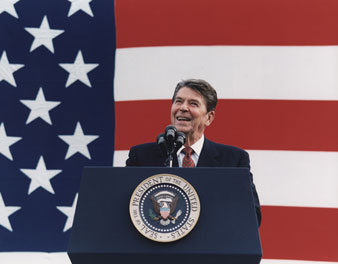 Everett CollectionRonald Reagan
Everett CollectionRonald Reagan
Like a veteran door-to-door salesman, Ronald Reagan is a huckster, only instead of vacuum cleaners, he peddles fear–so successfully that he is now president of the United States.
In the dark night of its soul, America felt sorry for itself. Unloved in the world, pushed around by glowering, unkempt ayatollahs, watching the Soviet Union wax strong and threatening, beset by seemingly uncontrollable inflation at home, their standard of living eroding, convinced that Washington was the root of all evils, a large number of voters turned to the reassuring, folksy strength of Ronald Reagan. While the aw-shucks Reagan ran a shrewd and clever campaign designed to convince voters they need not fear him, he implied that they must fear the world. Reagan, who liked to quote Franklin Roosevelt’s 1932 campaign pledge to balance the budget, might also have rephrased his inaugural speech: “The only thing we have is fear itself.”
Reagan’s campaign sounded political tocsins from the past beyond F.D.R.’s budget-balancing pledge. There were echoes of John Kennedy’s promise to “get America mov-ing again” in Reagan’s vow to put the nation back to work (paradoxically, the laissez-faire conservative was perceived as the activist), as well as hints of the twinkling uncle-hood of Ike. No matter that Reagan’s chief and only public economic prescription for achieving recovery was the Kemp-Roth plan–which he had gradually abandoned. Etched in our memory will be the victorious Alfonse D’Amato, who is perhaps (if you will excuse a little New York chauvinism) the most dismal of the new class of freshman Senators, elucidating on election night the Reagan vision: “inculcating a desire to do for yourself and unshackling initiative and, uh, people don’t want some big guy telling them how to run their business.” It was as clear a statement of the Reagan program as we have heard. Oh yes, he does advocate tax holidays for businesses that relocate in ghetto areas. This, coupled with his “two-tier” minimum wage, would put blacks and other minorities back to work, his brain trust promises. That is Reagan’s Third World policy in a nutshell: a tax giveaway to business coupled with a cheap and grateful labor force in heavily policed ghettos.
Popular
"swipe left below to view more authors"Swipe →
Inflation, the analysts said, was the $64,000 issue with the voters; yet before the elec-tion Time was reporting that Reagan had been “unable to convince a large number of voters that his approach would be much more successful than Carter’s.” True, the Reagan mantra that “Government causes inflation and government can end it” probably had a superficial appeal–but it tapped visceral anti-Washington sentiments more than it did the voters’ belief that balancing the budget and eliminating “fraud and waste” were the cures for inflation.
But again, the voters cared little about Reagan’s programs. In foreign affairs he was perceived fuzzily as a strong, consistent leader who would somehow stand up to the Russians and prevent the Irans of this world from ever humiliating the United States again. This adds up more to a reflexive neo-isolationism–“make the world go away,” as Eddy Arnold used to sing–than a vote for any sort of foreign policy. The eleventh-hour revival of the “hostage drama”–our national Passion play–stirred dormant emo-tions of self-pity (“Let our people go”) and truculence (“Nuke the Ayatollah”). A majority of voters would prefer a SALT II treaty, though Reagan was against it. A majority would also prefer stronger defenses, but could one deduce from that–as the fundamentalists so easily deduce it from Scripture–that Americans want an accelerated buildup of the MX, a B-1 bomber, a neutron bomb and an arms race with Russia? Indeed, the pollsters–if they can be believed–found considerable disparities between what a majority of Americans support and what Ronald Reagan said he would do. On E.R.A., Social Security, national health insurance, most Americans favor what Reagan opposes.
Perhaps the pollsters who found that a majority believed that Reagan was the candidate most likely to “make America feel good about itself again” put their finger on the only truly positive emotion behind the large vote for Reagan. Reagan stands for a simpler bygone America redolent of small-town virtues, solid family ties, free from troublesome feminists and gay activists, the family Bible on the TV set, Jerry FaIwell on the screen. This year the Moral Majority replaced Nixon’s silent majority of 1972. Neither really exist, of course, but a politician must sound themes that make people feel good about themselves.
Now, for a time, America can feel good about itself again. Reagan is the man from the land of the happy ending. Prosperity is, after all, just around the corner; the Russians will shrink to human size; the birds will sing and the children play without fear in our streets and on the grounds of American embassies all over the world; the avatar of the American dream has descended in the personhood of Ronald Reagan, whose sound remedy for unemployment is “get a job”–as he did when he became a sports announcer and the golden portals of Hollywood opened up to him. America will be the shining “city upon a hill,” Reagan’s crib from a sermon by John Winthrop in 1630 on board the ship Arbella bound for the New World.
At the close of F. Scott Fitzgerald’s The Great Gatsby, Nick Carraway stands and con-templates Long Island, “a fresh, green breast of the new world,” through the eyes of the first Dutch sailors, the last time a vision was provided “commensurate to man’s capacity to wonder.” Then he thinks of Gatsby, who believed in the green light and was “borne back ceaselessly into the past.” In The Crack-Up Fitzgerald also wrote: “It is sadder to find the past again and find it inadequate to the present than it is to have it elude you and remain forever a harmonious conception of memory.” America has found its past again; the sadness will come.


